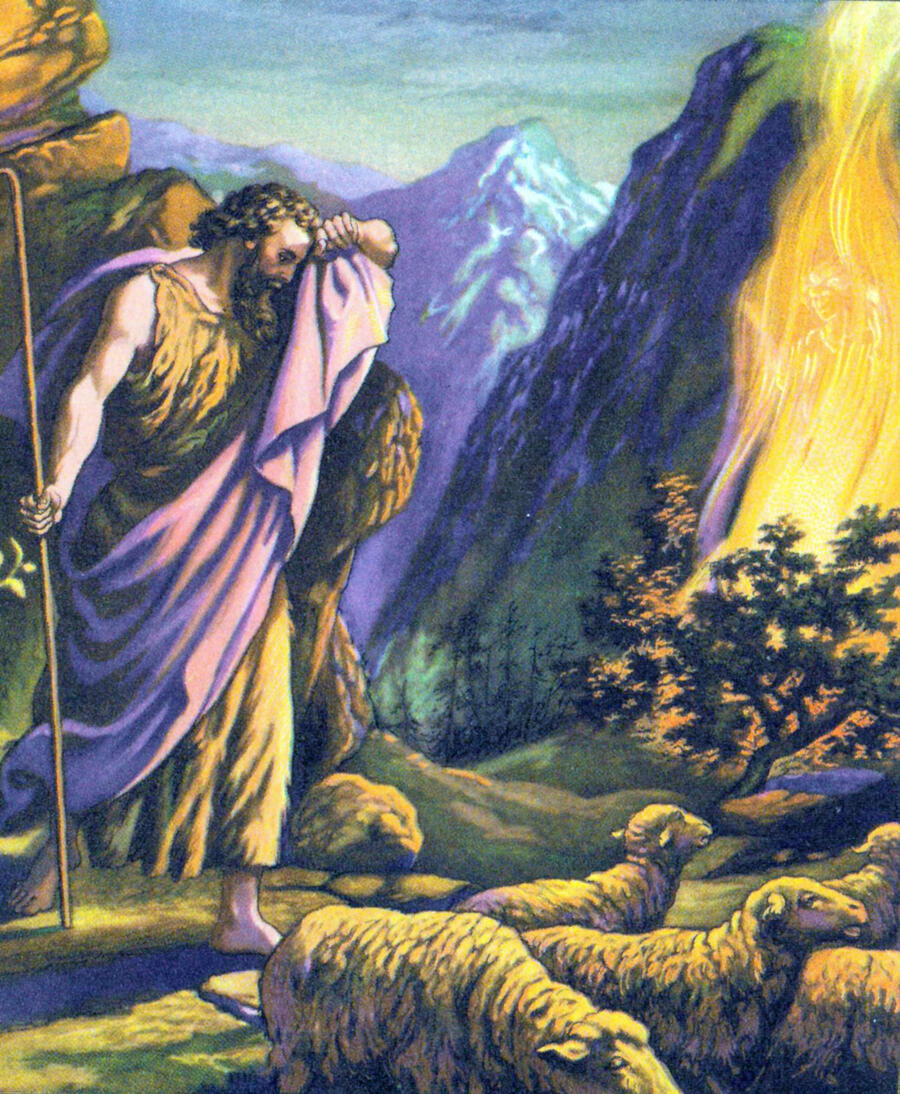
Contact: [email protected]
Click above for story text
Click above for story audio
Click above for story text
Click above for story audio
Click above for story text
Click above for story audio
Click above for story text
Click above for story audio
Click above for story text
Click above for story audio
Click above for story text
Click above for story audio
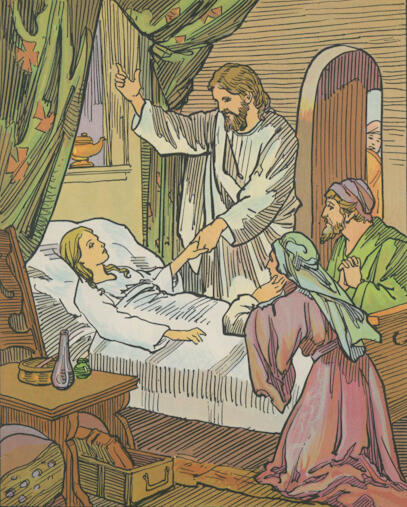
The Story of Jairus’ Daughter
From the Gospels
There was one man who was especially anxious to meet Jesus. His name was Jairus, and he was ruler of the Synagogue. He had listened to Jesus’ teaching and had watched with wonder as He healed the sick.
Jairus and his wife had a terrible trouble at home, and together they decided that no one but this wonderful Teacher could help them. So the moment Jesus reached the shore, Jairus came and flung himself down at His feet and cried:
“My little daughter lies at the point of death; I pray you come and lay your hands upon her, that she may be healed, and she shall live.”
Jesus turned came at once, but, to Jairus’ distress, the crowd was so great that Jesus could only walk very slowly. Every moment of delay was agony to the unhappy father.
Now in that crowd there was a poor woman who was so ill that she had given up all hope of ever getting well again. She had spent all her money on doctors, but instead of being better she was worse, and had now become very, very poor.
She had heard of this mighty Healer, but she had not the courage to go up to Him boldly and ask Him to make her well. But as she saw the kind way in which He looked at Jairus, she longed more than ever to be healed.
“Perhaps,” she thought, “He will never notice me in all this crowd;” and “If I may but touch His clothes, I shall be whole.”
So she crept nearer and nearer, and at last managed to reach out her hand and touch His clothes.
That very moment she felt strong and well and young again. Trembling with excitement, she tried to slip back amongst the crowd. But Jesus now turned, and looking round said:
“Who touched My clothes?”
The disciples were surprised that He should ask this question, for they were in a crowd. But Jesus knew that the touch of the woman was different from the pressure of the crowd, for she had touched Him with a prayer in her heart that she should be healed, and power had gone forth from him. So, fearing and trembling, the woman came and fell down before Him, and told Him the truth.
Then Jesus said unto her: “Daughter, your faith has made you whole. Go in peace and be healed of your infirmity.”
But meanwhile poor Jairus was grudging every moment of delay, and now he saw a messenger pressing through the crowd to reach him, and there was bad news in his face.
“Your daughter is dead. Why trouble the Master?” said the messenger.
Jairus could not speak for grief and disappointment, but Jesus, who had heard the message, said quietly to him:
“Be not afraid, only believe.”
You will notice, in all the stories, that Jesus Christ could do anything for people who believed in Him; but sometimes the people refused to believe in Him, and then He had to go away and could not do any of His mighty works for them.
Jairus believed in Jesus enough to lead Him to the house where his dead little girl lay. In that country the houses are more public than ours, and when Jesus reached the ruler’s house, crowds of people would have liked to follow Him inside to see what He would do.
Not only so, but already Jairus’ own friends, and especially the women, were making a terrible commotion, weeping and tearing their hair, and crying out in loud, shrieking voices, because the little girl was dead. But Jesus could do nothing while so much noise was going on. As He entered the house, He said quietly:
“Why are you making this noise? The child is not dead, but sleeps.”
But the people, in their ignorance, laughed at him.
Then Jesus commanded that everyone should be put out from the room where the dead child was lying, and He only allowed Jairus and the mother, and Peter and James and John, his disciples, to be with Him.
Very quietly He went up to the bed and gazed at the dead child.
He took hold of the limp, cold hand, and said:
“Little girl, I say unto you, arise.”
At the Master’s voice the little girl opened her eyes, saw Jesus, and rose up quite well and strong.
What joy there was in that sorrowful household! How Jairus and his wife thanked Jesus, and how the little girl must have loved Him for what He had done!
Jesus knew that she would be hungry after her illness, so before He left the house, He reminded the parents to give her something to eat.
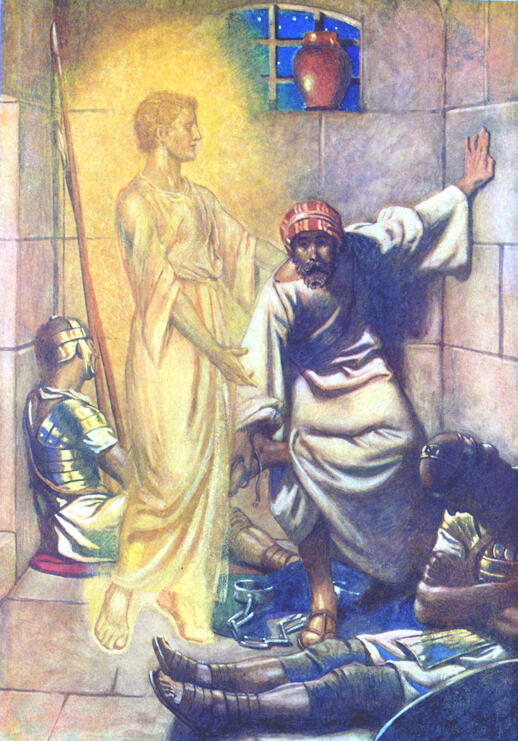
The Story of Peter’s Escape from Prison
From the New Testament Book of the Acts of the Apostles
It was a time when Christians had peace, and were allowed to preach as they wished, and were neither killed nor thrown into prison.
But then a new king, named Herod Agrippa, began to reign in Jerusalem. He was appointed King by the Romans, but he was anxious to make friends with the Rulers of the Jews, and he found that he could please them by persecuting the Christians.
He began by taking James, John’s brother, who was one of the chief of the Apostles, and ordering him to be slain by the sword.
There was terrible grief amongst the Christians at this deed, for they all loved James, and they knew that the persecutions were beginning again.
But there was great joy amongst the Rulers, and they came to Herod and flattered him, and praised him for what he had done.
So Herod determined to please them still more, and at Passover he sent his soldiers and dragged Peter himself off to prison.
The news spread that Herod intended, as soon as the feast was over, to bring him out and kill him by some cruel death.
The poor Christians prayed earnestly to God to save their leader out of the hands of Herod.
Peter was in prison, guarded night and day by four soldiers, who were changed every six hours.
His right arm was chained to the left wrist of a soldier, and his left arm was chained to the wrist of another soldier, and two soldiers stood at the doors.
Day by day Peter sat patiently in his prison. He talked to his guards and told them about Jesus Christ, but every day he wondered whether he would be dragged forth to die.
At last he heard that on the very next day Herod was going to bring him forth to his enemies.
But Peter had no fear. He lay down on his bed of straw, and slept as peacefully as a little child. But he was suddenly awakened by a bright shining light in his cell, and someone struck him on his side. Looking up amazed, Peter saw a beautiful Angel standing before him.
“Rise up quickly!” said the Angel. The chains dropped from Peter’s hands. Then the Angel told him to put on his sandals and his cloak and fasten up his garments so that he could walk. Peter did exactly as he was told, but all the time he thought it was a dream.
He followed the Angel, and they passed the first soldier on guard at the door; but he did not see them. Then they passed the second soldier, and he also never saw them; and coming to the great iron gate which led into the city, this gate opened of its own accord, and Peter and the Angel passed through. Then, as suddenly as he had come, the Angel left Peter, and he found himself alone in the dark street.
Yet still Peter thought he was dreaming. But the night air blew upon him, and as he gazed up at the stars and the glorious Easter moon, he knew at last that it was all real, and not a dream.
“Now I know surely,” he said to himself, “that the Lord has delivered me out of the hand of Herod.”
He knew that all his sorrowing friends had been praying for him, and he guessed that some of them would be awake in the house of Mary.
It was a large house, with an outer gate or porch, and as Peter knocked, a young girl named Rhoda, who was the gate keeper, heard him knocking and asked who was there.
But when Peter answered her, she knew his voice in a moment, and she was so wild with joy that she forgot to open the gate and rushed into the house to tell all the Christians that Peter had come. They said to her: “You are crazy!” but Rhoda said over and over again that she was quite sure it was Peter.
“It is his angel,” said someone. And as they argued, Peter kept on knocking.
So at last they ventured to go and open the gate, and to their amazement they found that Rhoda was right, and that Peter himself was standing there.
But Peter put up his hand, as a hint to them to be very quiet, and then he came inside and told how the Angel of the Lord had brought him out of prison.
After he had given them directions that they were to tell some of the other Christians, he wished them good-bye, and he escaped to a quiet place out of reach of Herod.
We can imagine what excitement there was in the prison the next morning, when it was found that Peter had gone, and that only the chains were there.
It was not very long after this that Herod went to the city of Caesarea, and seated on a throne, clothed in his royal apparel, he made a great speech to the people which so delighted them that they shouted with joy and cried out:
“It is the voice of a god, and not of a man!”
Herod was proud that they should think him a god, and instead of rebuking the crowd for saying such a foolish thing, he showed that he was very pleased.
But God will not allow man to think of himself as equal with God, and He sent His Angel to smite Herod with a dreadful disease. So Herod died, and the Christians had peace once more.
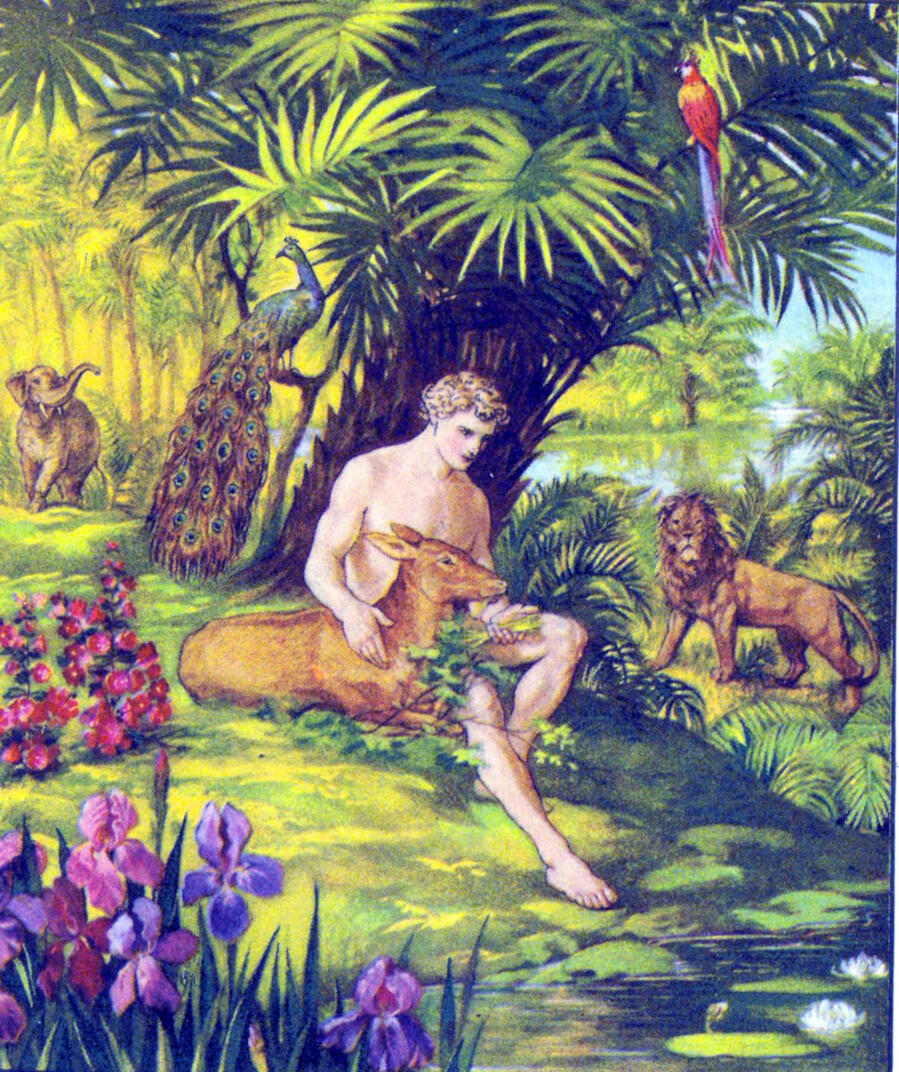
In the Garden
From the Old Testament Book of Genesis
Every child knows that in this world there are pain and trouble and sin, as well as joy and happiness and goodness; and there is a beautiful, but very sad story told us in the beginning of the Bible, which may help us to understand how this came about.
In the beginning the Lord God planted a garden in Eden. And out of the ground the Lord God made to grow every tree that is pleasant to the sight, and good for food; the tree of life was also in the midst of the garden, and the tree of the knowledge of good and evil. And the Lord God took the man, and put him in the Garden of Eden to till and keep it. And the Lord God commanded the man, saying: Of every tree in the garden you may freely eat; but of the tree of the knowledge of good and evil, you shall not eat; for in the day that you eat of it, you shall surely die.”
At first Adam was alone in the beautiful garden. He worked in it and took care of the flowers and the trees; and God brought the animals to Adam and he gave them their names.
After a while, the Lord God said that it was not good for Adam to be alone, so he sent him a wife named Eve. Casting Adam into a deep sleep he took a rib from Adam’s side and built it up into a woman. When Adam awoke and beheld the woman, he cried out, “Behold, at last this is flesh of my flesh and bone of my bone! She will be called ‘woman,’ because she was taken out of man.”
At first, Adam and Eve were very happy together, for they were both pure and holy and had no fear of evil. Adam told his wife what the Lord God had said about the tree of the knowledge of good and evil, and how they had been commanded not to eat of it.
It happened one day, however, that when Eve was walking near the tree a serpent spoke to her and asked:
“Has God really said, ‘You shall not eat of any tree of the garden’?”
And Eve answered the serpent:
“We may eat fruit from the trees of the garden, but not the fruit of the tree which is in the middle of the garden. God has said, ‘You shall not eat of it. You shall not touch it, lest you die.’ ”
And the serpent said unto the woman, “You won’t really die, for God knows that in the day you eat it, your eyes will be opened, and you will be like God, knowing good and evil.”
Perhaps Eve had longed to eat of the tree before the serpent tempted her, and now, as she looked at the lovely fruit, she began to think that the Lord God had been unkind in forbidding her to eat of it, and she believed the wicked serpent instead of the Lord God, her Friend. So she took some of the fruit and ate it, and then she gave some to Adam, and he ate of it also.
But alas! the moment they had eaten the fruit, they understood what doing wrong meant, and for the first time they felt ashamed. In the beginning they had not needed to wear any clothes, but now they took some large fig leaves and sewed them together to cover themselves.
But when the sun went down and the air grew cool, Adam and his wife heard God walking in the garden. Their fear grew greater every moment, and whereas on other days they had always hurried forth with joy to meet the Lord God, now they hid themselves amongst the thick trees. Then the Lord God called to Adam, and Adam had to come forth, and confess to God that he had hidden himself because he was ashamed.
And God said to Adam gravely:
“Have you eaten from the tree that I commanded you not to eat from?”
Then Adam blamed Eve, who in turn told God it was the serpent that had tempted her.
So God said to serpent: “You shall go on your belly and you shall eat dust all the days of your life. I will put hostility between you and the woman and between your offspring and hers.”
God said to Eve: “I will greatly multiply your pain in childbirth. Your desire will be for your husband, and he will rule over you.”
And to Adam God said: “The ground is cursed because of you. You will eat bread by the sweat of your face until you return to the ground, for you were taken out of it. For you are dust, and you shall return to dust.”
The happy days in the garden were over, and God was obliged to send humanity into the wide world to work hard and to bear pain and trouble, until such time as a Savior should come and break the curse of sin and death.
Text
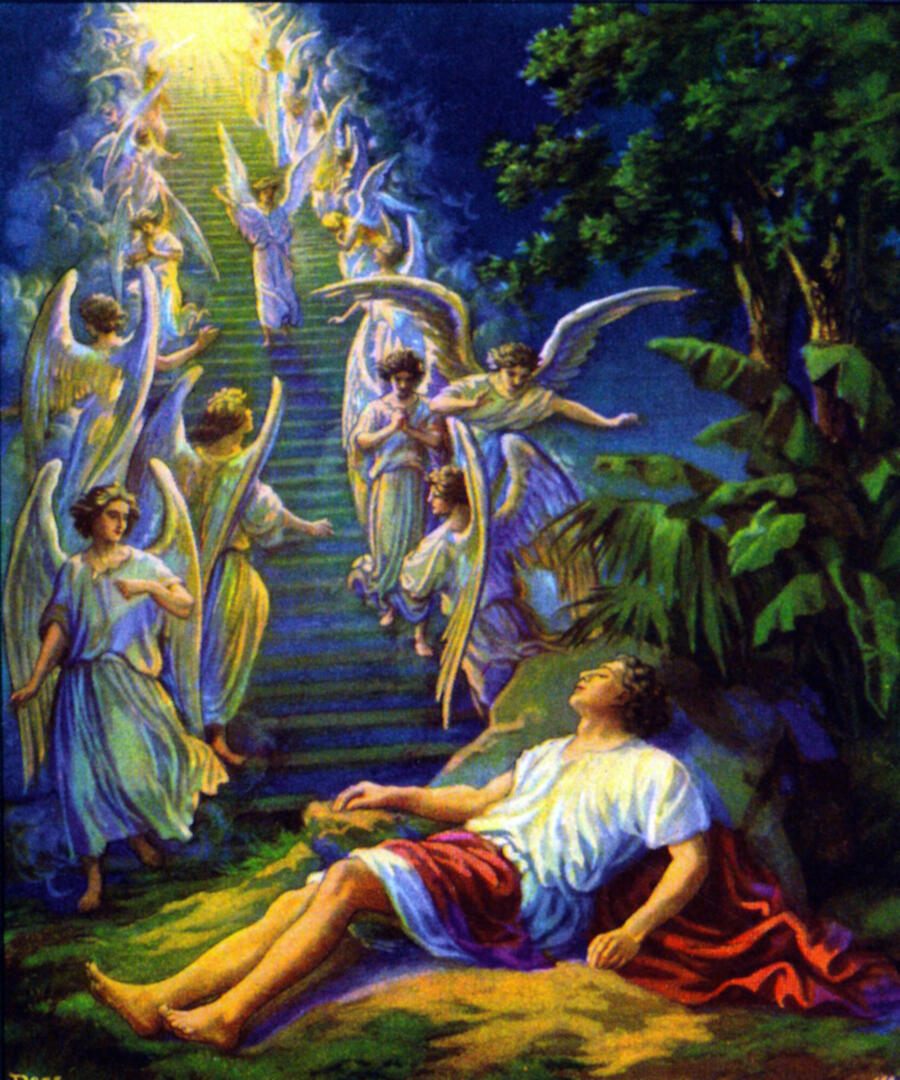
The Story of Jacob’s Wonderful Dream
From the Old Testament Book of Genesis
This is a part of the many adventures of Jacob, one of the grandsons of Abraham.
In parting with Jacob, Isaac his father commanded him that he must not marry a heathen woman, as his brother Esau had done, but must find a wife among some of his cousins in Haran. Isaac also gave Jacob another blessing, saying:
“And God Almighty bless you, and make you fruit¬ful, and multiply you, that you may be a multitude of people. And may the blessing of Abraham be given you, and to your descendants; that you may inherit the land in which you are a stranger, which God gave to Abraham.”
So Jacob set forth alone on his journey. When the darkness fell, he wrapped his cloak about him, covering his head, and lay down with a stone for his pillow.
On each side of him the limestone rocks rose in steps towards the darkening heavens, and before he closed his eyes he looked upwards and saw the mighty rocks out¬lined against the star-glistening sky. In his loneliness he thought of his aged father, his broken-hearted mother, his angry brother, and of God and the wonderful promise of which his grandfather had told him.
After he had been asleep for some time, he dreamed; and lo, there was a mighty staircase set up on the earth, reaching right to heaven, and on this staircase the angels passed up and down in all their bright glory, while, high above all, Jacob saw a vision of the Lord Himself. And in his dream, Jacob heard God say:
“I am the Lord God of Abraham your father, and the God of Isaac; the land which you lie on, to you will I give it, and to your descendants. And your seed shall be as the dust of the earth; and you shall spread abroad to the west, and to the east, and to the north, and to the south; and in you, and in your seed, shall all the families of the earth be blessed. And behold, I am with you, and will keep you in all the places where you are going and will bring you again into this land.”
Then Jacob woke from his sleep, all amazed as the morning dawned upon him.
He was awed and afraid, and said to himself:
“How fearful is this place! This is none other than the house of God, and this is the gate of heaven.” And he named the place Beth-el.
So he rose up, and took the stone he had had for a pillow, and set it up on end as a pillar, and poured oil on the top of it, as a sign of honor to God. He vowed to God that he would serve Him, and then went on his way, filled with wonder and praise to God.
It was many years after this that Jacob returned to the land of Canaan, back to the very place where he had dreamed his wonderful dream.
Here God met him again, and blessed him, and told him that his name should be changed from Jacob to Israel. Israel means “he who struggles with God”, and Jacob’s descendants were called the Children of Israel, or the Israelites.
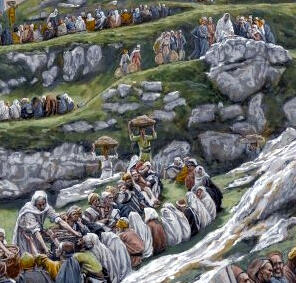
The Story of The Five Loaves
From the Gospels
One day, Jesus had sad news that John the Baptist had been killed by King Herod. So He asked His disciples to come away alone with Him to the far side of the lake, for they were all tired, and had no time even to eat.
But as soon as the people spied the boat setting sail, they spread the news, and thousands of them ran on foot round by the head of the lake, and when Jesus arrived He found a great crowd waiting for Him. How vexed and disappointed the disciples felt! But Jesus, looking on the multitude, was sorry for them, for His heart was so full of love that He could not be angry with anyone for wanting to be near Him. So He patiently went on teaching and healing their sick, until at last the sun began to set in glory over the western hills, and everyone knew that darkness would soon fall over all the land.
The disciples, growing impatient, said to Jesus:
“This is a deserted place, and now the time is far passed; send them away, that they may go into the villages and buy themselves bread, for they have nothing to eat.”
But Jesus answered: “You give them something to eat.”
The disciples were amazed at such a command, and answered:
“Shall we go and buy two hundred days wages worth of bread, and give it to them to eat?”
Jesus answered them by asking how many loaves they had. Then Andrew, Peter’s brother, came up and said that there was a lad who had five loaves and two fishes. But what were they among so many?
Jesus commanded that everyone should sit down. There was to be no crowding nor commotion. So they sat down in little groups of fifty and a hundred together. Then Jesus took the loaves and the fishes, and looking up to heaven He blessed them, and broke up the bread and the fishes, and divided them between His disciples.
Now a wonderful thing happened, for each disciple found his portion lasted until he had fed every group of his people. All ate as much as they could, and everyone was satisfied. Indeed, there were so many broken pieces left that they gathered up enough to fill twelve baskets.
This was one of the most strange and marvelous miracles the people had yet seen, and many of them cried out:
“This is truly that prophet that is coming into the world!”
And as they talked among themselves, they made up their minds to surround Jesus and take Him back to the cities, and force Him to set Himself up against Herod, and become the King of the Jews. But Jesus would not allow this; and seeing that His disciples were weary, He persuaded them to get into the boat and return across the lake, while He stayed and sent the multitude away.
At last all the people had gone, so Jesus went up a steep hill, quite alone, that He might pray to His Father.
But presently, as He looked down on the lake, He could see that the boat in which His disciples were had reached the middle of the water, but the wind was blowing straight against it from the west, so that the rowing disciples could not make any headway. Jesus knew that His disciples needed Him; so in the middle of the night, just as they were despairing of ever reaching the land, they looked up and saw Jesus, walking on the surface of the water.
At first they thought He must be a spirit, and they were quite terrified, but instantly Jesus called to them, and said:
“Be of good cheer; it is I; be not afraid.”
How well they knew His voice! And Peter cried out:
“Lord, if it is you, bid me come to you on the water!”
And He said:
“Come!”
And when Peter was come down out of the ship, he walked on the water to go to Jesus. But when he saw how wild the wind and the waves were, he was afraid, and, beginning to sink, he cried out, saying:
“Lord, save me!”
And immediately Jesus stretched forth His hand, and caught him, and said unto him:
“O you of little faith, why did you doubt?”
And when they were back on the ship, the wind ceased. And those that were in the ship came and worshipped Jesus, saying:
“Truly you are the Son of God.”
